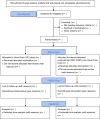Randomised controlled trial on the effect of internet-delivered computerised cognitive-behavioural therapy on patients with insomnia who remain symptomatic following hypnotics: a study protocol
- PMID: 29382675
- PMCID: PMC5829590
- DOI: 10.1136/bmjopen-2017-018220
Randomised controlled trial on the effect of internet-delivered computerised cognitive-behavioural therapy on patients with insomnia who remain symptomatic following hypnotics: a study protocol
Abstract
Introduction: Insomnia has severe consequences for health. Primary care physicians in Japan commonly provide hypnotics, which is far from optimal. The recommended treatment for insomnia is cognitive-behavioural therapy (CBT). Access to trained therapists, however, is limited. Rather than face-to-face CBT, several researchers have studied internet-delivered computerised CBT (ICBT). This paper describes the study protocol for a randomised controlled trial (RCT) to evaluate effectiveness and feasibility of our newly developed five-step ICBT as an adjunct to usual care (UC) compared with UC alone for patients with insomnia who remain symptomatic following hypnotics.
Methods and analysis: This proposed exploratory RCT comprises two parallel groups (ICBT+UC and UC alone) consisting of 15 participants each (n=30) diagnosed with insomnia who remain symptomatic after pharmacotherapy. We aim to evaluate the effectiveness of six intervention weeks. The primary outcome of insomnia severity will be the Pittsburgh Sleep Quality Index (PSQI) at week 6. Secondary outcomes include sleep onset latency, total sleep time, sleep efficiency extracted from PSQI, current feeling of refreshment and perceived soundness of sleep measured using visual analogue scale, number of awakenings, anxiety by Hospital Anxiety and Depression Scale, depression by Center for Epidemiologic Studies Depression Scale and quality of life by Euro Qol-5D. All measures will be assessed at weeks 0 (baseline), 6 (postintervention) and 12 (follow-up), and intention-to-treat analysis will be applied. The statistical analysis plan has been developed considering design of field materials.
Ethics and dissemination: This study will be conducted at the academic outpatient clinic of Chiba University Hospital, Japan. Ethics approval was granted by the Institutional Review Board of Chiba University Hospital. All participants will be required to provide written informed consent. The trial will be implemented and reported in accordance with Consolidated Standards of Reporting Trials recommendations.
Trial registration number: UMIN000021509; Pre-results.
Keywords: cognitive behavioral therapy; insomnia; internet; randomized controlled Trial.
© Article author(s) (or their employer(s) unless otherwise stated in the text of the article) 2018. All rights reserved. No commercial use is permitted unless otherwise expressly granted.
Conflict of interest statement
Competing interests: None declared.
Figures
Similar articles
-
Effectiveness of Internet-Delivered Computerized Cognitive Behavioral Therapy for Patients With Insomnia Who Remain Symptomatic Following Pharmacotherapy: Randomized Controlled Exploratory Trial.J Med Internet Res. 2019 Apr 11;21(4):e12686. doi: 10.2196/12686. J Med Internet Res. 2019. PMID: 30973344 Free PMC article. Clinical Trial.
-
Digital cognitive-behavioural therapy application compared with zolpidem for the treatment of insomnia: protocol for an exploratory randomised controlled trial.BMJ Open. 2024 Jun 25;14(6):e081205. doi: 10.1136/bmjopen-2023-081205. BMJ Open. 2024. PMID: 38925698 Free PMC article.
-
Effects of e-aid cognitive behavioural therapy for insomnia (eCBTI) to prevent the transition from acute insomnia to chronic insomnia: study protocol for a randomised controlled trial.BMJ Open. 2019 Nov 18;9(11):e033457. doi: 10.1136/bmjopen-2019-033457. BMJ Open. 2019. PMID: 31740476 Free PMC article.
-
Psychological treatment for insomnia in the regulation of long-term hypnotic drug use.Health Technol Assess. 2004 Feb;8(8):iii-iv, 1-68. doi: 10.3310/hta8080. Health Technol Assess. 2004. PMID: 14960254 Review.
-
Efficacy of online and face-to-face cognitive behavioral therapy in the treatment of neurological insomnia: a systematic review and meta-analysis.Ann Palliat Med. 2021 Oct;10(10):10684-10696. doi: 10.21037/apm-21-2387. Ann Palliat Med. 2021. PMID: 34763429
Cited by
-
Effectiveness of Unguided Internet-Based Cognitive Behavioral Therapy and the Three Good Things Exercise for Insomnia: 3-Arm Randomized Controlled Trial.J Med Internet Res. 2022 Feb 9;24(2):e28747. doi: 10.2196/28747. J Med Internet Res. 2022. PMID: 35138259 Free PMC article. Clinical Trial.
-
Effectiveness of Internet-Delivered Computerized Cognitive Behavioral Therapy for Patients With Insomnia Who Remain Symptomatic Following Pharmacotherapy: Randomized Controlled Exploratory Trial.J Med Internet Res. 2019 Apr 11;21(4):e12686. doi: 10.2196/12686. J Med Internet Res. 2019. PMID: 30973344 Free PMC article. Clinical Trial.
References
-
- American Psychiatric Association. Diagnostic and statistical manual of mental disorders. 5th ed Washington: American Psychiatric Association, 2013.
-
- Lichstein KL, Durrence HH, Reidel BW, et al. ; The epidemiology of sleep: age, gender and ethnicity. Mahwah: Lawrence Erlbaum Associates, 2004.
-
- Morphy H, Dunn KM, Lewis M, et al. Epidemiology of insomnia: a longitudinal study in a UK population. Sleep 2007;30:274–80. - PubMed
Publication types
MeSH terms
Substances
Associated data
LinkOut - more resources
Full Text Sources
Other Literature Sources
Medical

